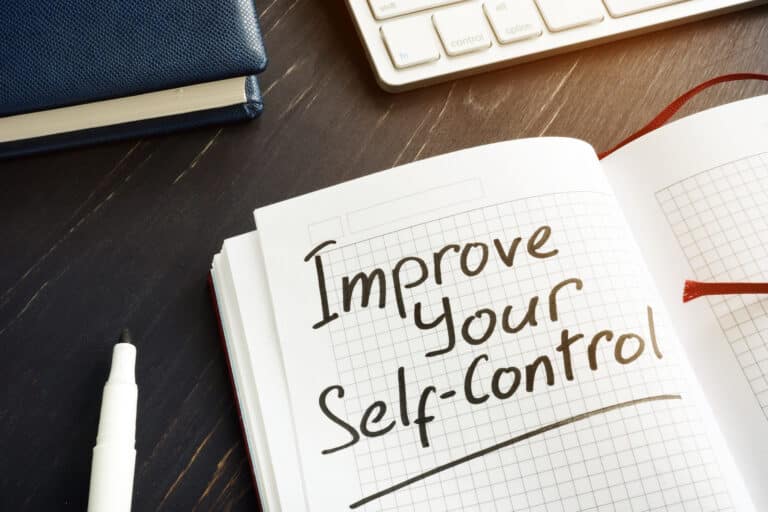Article Summary:
Self-control can be learned and developed. Good leaders demonstrate self-control, mastering their impulses and emotions.
+++
Self-control is our ability to manage our impulses, emotions, feelings, and desires to influence our behavior, especially in difficult situations. It’s a form of self-discipline that helps us address our weaknesses, avoid undesirable behavior, and pursue what’s right despite temptations otherwise.
Self-control entails avoiding or refusing things that are bad for us and those we care about—and building a capacity to work toward long-term goals despite short-term costs or challenges. It involves avoiding impulsive behaviors and modeling our core values as leaders, parents, and/or citizens.
Intuitively, we know this is hard. Thousands of years ago, Plato observed the human struggle between rationality and desire.
Many of us admire athletes and sports champions, especially the ones who develop an incredible work ethic, sacrifice greatly, and battle back from injury or other adversity, rising up to incredible feats.
“Getting to the top and staying there… present unique and formidable challenges. To do either requires great Self-Control. This… addresses the importance of controlling yourself in all areas—avoiding temptations, avoiding emotionalism, avoiding peaks and valleys of effort.
I viewed Self-Control, both personal and by our team, as a sixth Bruin on the court during my years at UCLA. That invisible sixth player was as important as any of the visible players.”
-John Wooden, Wooden on Leadership
Self-Control in Action: Jackie Robinson
Think of Jackie Robinson, the first African-American baseball player to play in the major league. A former star in four sports at UCLA, Robinson agreed to take on a boundary-shattering role in professional sports and society that would bring much grief and danger. He faced not only opposing players who sought to injure him with dirty plays but also some opposition even within his own team, racial slurs, bigotry, and death threats. And yet he carried on, focusing on the task at hand and not letting it derail his efforts. In the book, Negotiating in the Leadership Zone, author Ken Sylvester wrote that Robinson showed “a world-class demonstration of self-control and emotional maturity.”
“Robinson,” Sylvester wrote, “was bound and determined that he would perform to the highest level. And, that he did.” For example, Robinson was Rookie of the Year, All-Star player for six consecutive years, and National League Most Valuable Player. He also became the first African-American player inducted into the National Baseball Hall of Fame and had his jersey number (42) permanently retired from the game on the 50th anniversary of his breaking the color barrier.

Examples of Lack of Self-Control
We’re all guilty of lapses in self-control at times, and some of us struggle with poor self-control generally. We can be irritable, impatient, or impulsive. Sometimes we may binge on junk food, Netflix series, or social media (often a form of numbing). We may cheat, lie, steal, or harm innocent people. Perhaps we let our anger overcome us and turn into rage against others, maybe even those we care for, respect, and love. Some cheat on their partner or abuse alcohol or drugs.
Lack of self-control often results in poor choices and bad consequences. If we stop and look, we see it all around us, from political leaders and their vices or corruption to friends and colleagues who keep digging their own holes.

Leadership Derailers Assessment
Take this assessment to identify what’s inhibiting your leadership effectiveness. It will help you develop self-awareness and identify ways to improve your leadership.
The Consequences of Poor Self-Control
Poor self-control often leads to feelings of shame and guilt, especially when we realize we’ve harmed our relationships with loved ones or colleagues. If the abusive behavior is serious enough, the punishments may be loss of employment, the breakup of a marriage or partnership, or even incarceration.
According to researchers, lower levels of self-control at work lead to:
- decreased prosocial behavior (e.g., workers who are less likely to help colleagues, less likely to speak up about problems, and less likely to engage in corporate voluntarism)
- increased unethical behavior such as lying, stealing, and fraud
- lower job performance, in part due to less effort exerted, less time spent on challenging tasks, and more time wasted on distractions
Researchers also point to negative consequences for leaders with lower levels of self-control, including weaker relationships with their followers, more abusive leadership behaviors, and lower perceptions of their charisma.
Causes of Poor Self-Control
Poor self-control may be caused or aggravated by many things, including:
- poor sleep or sleep deprivation
- unhealthy diet
- insufficient exercise
- overwork and workaholism
- pressure and stress
- burnout
- anger
- resentment
- a controlling, obsessive, or compulsive personality
- lacking a moral compass to guide us in what’s right or wrong
- bad examples from authority figures such as parents, teachers, coaches, and bosses
It’s important to understand that there’s a physiological component to self-control. Many people think of it solely in terms of willpower, but that’s a mistake. According to researchers, self-control is a finite cognitive resource that gets tapped and can become depleted if it’s not replenished, much like our physical strength can wane if we don’t rest properly between exertions.

Personal Values Exercise
Complete this exercise to identify your personal values. It will help you develop self-awareness, including clarity about what’s most important to you in life and work, and serve as a safe harbor for you to return to when things are tough.
The Benefits of Good Self-Control
Self-control comes with all sorts of benefits in many different areas of our lives, from personal to professional. According to researchers Kai Chi (Sam) Yam and colleagues writing in their Harvard Business Review article, “Leadership Takes Self-Control,” “hundreds of studies have shown the positive effects that come from possessing self-discipline.”
According to the research, people with higher levels of self-control tend to perform better at school, have a healthier diet, and build quality friendships. They’re also less likely to struggle with substance abuse.
What about leaders? Leaders with higher levels of self-control are more likely to inspire and challenge their followers intellectually, and less likely to be micromanaging or abusive.
According to a 2017 study of 218 U.S. Air Force officers, researchers identified self-control as the single most important factor in personal psychological flourishing, leadership effectiveness, job performance, perceptions of team ethics, and display of character. Teams perceived leaders with high levels of self-control as being more ethical, honest, humble, and empathetic—and as displaying more moral courage. In essence, self-control was the mechanism by which leaders put character into action.
How to Develop Self-Control
So, how do we develop our self-control? We can think of it on two levels: first, what we can do as individuals to build and maintain this capacity; second, what leaders can do to help their followers develop self-control. We address both in turn below.
As individuals, we can:
- start by recognizing the value of self-control and how it can upgrade so many elements of our lives, in the process motivating us to improve at it
- take good care of ourselves, getting good sleep* (which turns out to be a linchpin), eating well, and exercise/moving their bodies
- engage in centering and renewing activities like deep breathing, yoga, meditation, or other mindfulness practices
- feel our emotions as they arise, observe them, and then let them go (in the process, developing our emotional intelligence and self-regulation)
- get perspective and place challenges in the larger context of our lives
- develop good habits systematically, in the process crowding out bad habits that diminish our self-control
- have sanctuary—places and practices of peace to calm our minds, get perspective, and reflect or pray
- have a set of personal core values and a moral compass that guides our behavior
- care for and value other people, prioritizing our relationships
- admit when we make mistakes and apologize for them, showing humility and taking responsibility
- have trusted advisors and/or small groups from whom we can seek input, counsel, and support
- seek help from mentors, coaches, counselors, or therapists when needed
- set boundaries around ourselves and certain subjects to avoid problems
- remove ourselves from tempting situations to avoid trouble before it starts
As leaders, we can help people do all of the above, plus the following:
- train people on emotional intelligence, self-regulation, and ethics
- develop people’s heart characteristics, including their character and courage
- co-create a shared purpose, values, and vision for our team or organization, building them into the culture so that workers can point to and rely on them as sacred shared commitments
- create a work environment conducive to self-care, ethical decision-making, character development, open vetting of difficult issues, accountability for mistakes, and self-control

Alignment Scorecard
When organizations aren’t aligned, it can reduce performance dramatically and cause frustration and dysfunction. With this Alignment Scorecard, you can assess your organization’s level of alignment and make plans for improving it.
Conclusion
We all struggle with self-control at times. That’s part of our shared human experience. Fortunately, self-control can be learned and developed. If we apply ourselves well to it, we can upgrade our lives dramatically—and avoid costly regrets.
Good leaders develop self-control.
Reflection Questions
- Are you satisfied with your self-control?
- When have you lost your self-control? Are there any commonalities or patterns?
- What might you do from the list above to develop your self-control further?
- Who might you ask for help in doing so?
Tools for You
- Leadership Derailers Assessment to help you identify what’s inhibiting your leadership effectiveness
- Personal Values Exercise to help you determine and clarify what’s most important to you
- Alignment Scorecard to help you assess your organization’s level of alignment
Postscript: Inspirations on Self-Control
- “Discipline yourself and others won’t need to.” -John Wooden, legendary basketball coach
- “Self-control is a key factor in achieving success. We can’t control everything in life, but we can definitely control ourselves.” -Jan Mckingley Hilado, entrepreneur and author
- “Such power there is in clear-eyed self-restraint.” -James Russell Lowell, American poet
- “You have power over your mind—not outside events. Realize this, and you will find strength.” -Marcus Aurelius, Roman emperor
- “By constant self-discipline and self-control you can develop greatness of character.” -Grenville Kleise, author
- “What we do upon some great occasion will probably depend on what we already are, and what we are will be the result of previous years of self-discipline.” -H.P. Liddon, English theologian
- “I am very happy because I have conquered myself and not the world.” -Sri Chinmoy, Indian spiritual leader
- “We must all suffer from one of two pains: the pain of discipline or the pain of regret. The difference is discipline weighs ounces while regret weighs tons.” -Jim Rohn, entrepreneur and author
- “Every important mistake I’ve made in my life, I’ve made because I was too tired.” -Bill Clinton, former U.S. president
- “I will be calm. I will be mistress of myself.” -Jane Austen, Sense and Sensibility
- “Self-control is the chief element in self-respect, and self-respect is the chief element in courage.” -Thucydides, History of the Peloponnesian War
- “I cannot trust a man to control others who cannot control himself.” -Robert E. Lee, Confederate General
- “…it is better to have self-control than to control an army.” -Proverbs 16:32
Appendix: Research on Self-Control
- Sosik, J. J., Chun, J. U., Ete, Z., Arenas, F. J., & Scherer, J. A. (2019). Self-control Puts Character into Action: Examining How Leader Character Strengths and Ethical Leadership Relate to Leader Outcomes. Journal of Business Ethics, 160(3), 765–781.
- Tangney, J. P., Baumeister, R. F., & Boone, A. L. (2004). High self-control predicts good adjustment, less pathology, better grades, and interpersonal success. Journal of Personality, 72(2), 271–324.
* According to Kai Chi (Sam) Yam and colleagues in their Harvard Business Review article, “Leadership Takes Self-Control”: “…sleep appears to have amazing restorative effects on self-control. One study found that leaders who slept well at night (defined as having minimal interruptions to sleep) were much more likely to exercise their self-control and refrain from displaying abusive supervision, such as yelling and cursing at low-performing subordinates, compared to their counterparts who did not sleep well.”

Triple Crown Leadership Newsletter
Join our community. Sign up now and get our monthly inspirations (new articles, announcements, opportunities, resources, and more). Welcome!
+++++++++++++++++++++++
Gregg Vanourek and Bob Vanourek are leadership practitioners, teachers, and award-winning authors (and son and father). They are co-authors of Triple Crown Leadership: Building Excellent, Ethical, and Enduring Organizations, a winner of the International Book Awards. Check out their Leadership Derailers Assessment or get their monthly newsletter. If you found value in this, please forward it to a friend. Every little bit helps!


